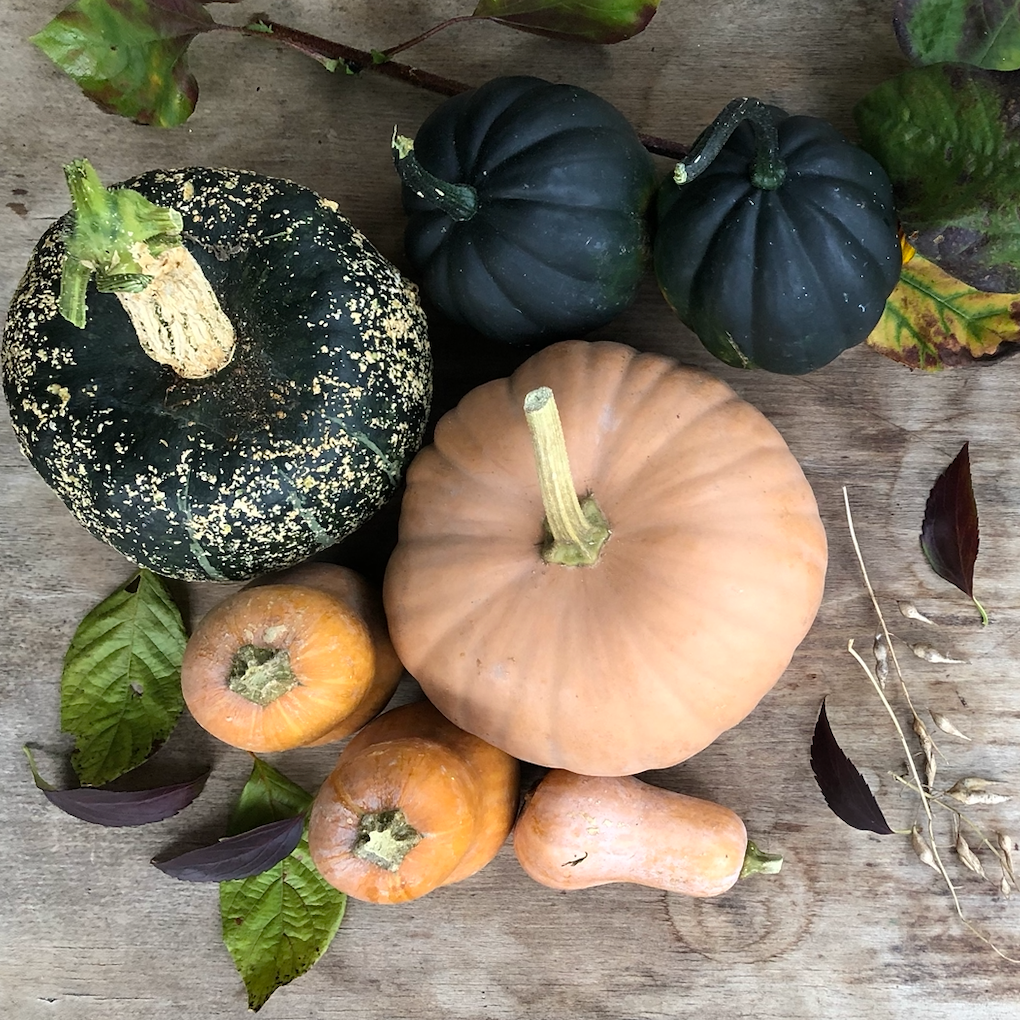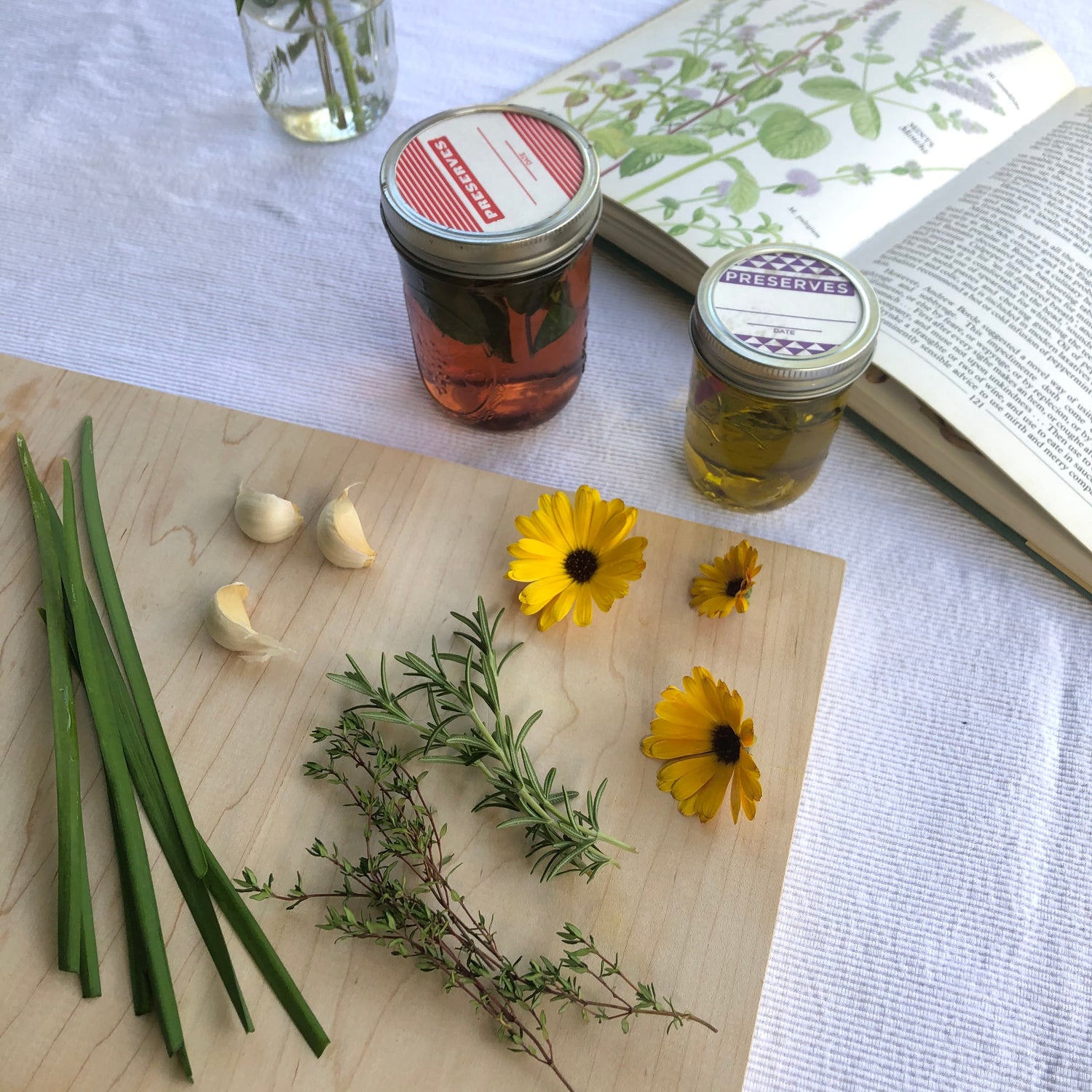 Anyone who has driven down the picturesque Springtown Road in New Paltz, NY has probably seen Kira Kinney's iconic farmer crossing sign, a standard tractor warning sign that has been slightly altered to feature Kira's braid. About 80 miles north of New York City, Kira farms over 20 acres of many heirloom vegetables, baby greens, herbs and pasture raised eggs.
Anyone who has driven down the picturesque Springtown Road in New Paltz, NY has probably seen Kira Kinney's iconic farmer crossing sign, a standard tractor warning sign that has been slightly altered to feature Kira's braid. About 80 miles north of New York City, Kira farms over 20 acres of many heirloom vegetables, baby greens, herbs and pasture raised eggs.
Evolutionary Organic's diverse farm operation also includes her handmade hot sauces, made from the diverse array peppers and other ingredients she grows, as well as other preserved farm goods. Established in 2003, Evolutionary Organics was one of the first organic farms in the region selling produce year-round, before "organic" and "four-season" farming become popular concepts. Kira sells her produce and farm goods at the weekly GrowNYC farmer's market in Grand Army Plaza, Brooklyn, and has a local summer CSA program in New Paltz, NY.
Kira is a force: hard working, high energy, seemingly unstoppable. She is also open and down-to-earth and in our interview shares insight into her truly evolutionary approach to farming, keeping her entire operation diverse, flexible, and resilient.

1. You established Evolutionary Organics in 2003. How did you grow into the farm you are today?
Really the farm was started while I was still in college in 1994 on the land I grew up on in Pine Bush. 2003 is when I started on this place in New Paltz. I worked on a farm as a kid and grew up on an Old Macdonald's type of farm. I worked on a farm one summer break from college, after which I decided I did not need to work for someone else, I could just do this. I mean, looking at that now, it was a preposterous idea, yet here I am doing this. I came to this before there were so many options of programs to teach people farming or intern options. I keep thinking someday the farm is going to be what it is, and then it will be just this thing that I mostly repeat from one year to the next, but apparently that is not who I am as things are forever in flux. I figure the year I end a season without saying,"next year I am going to...." will be the year I am done farming. It was slow growing, from 1 acre to 2, to 4 to 7 and then there was a bit of a boom, filling the farm I have, which gives me 14 growable acres to leasing extra land, to now co-owning a second piece of land, allowing about 35 acres for crops. The farm went from 1 market, up to 3, and is now back to 1 year round, plus a CSA from June to November on site. The next plan is adding on a farm store, nursery, place to eat -- trying to bring more of the market back home.
I figure the year I end a season without saying,"next year I am going to...." will be the year I am done farming. It was slow growing, from 1 acre to 2, to 4 to 7 and then there was a bit of a boom, filling the farm I have, which gives me 14 growable acres to leasing extra land, to now co-owning a second piece of land, allowing about 35 acres for crops. The farm went from 1 market, up to 3, and is now back to 1 year round, plus a CSA from June to November on site. The next plan is adding on a farm store, nursery, place to eat -- trying to bring more of the market back home.
2. Farming can be pretty harsh, there's a lot riding on the weather. How do you prepare for challenges?
I divide a lot of my plantings so parts of whatever crop end up on some of the higher drier lands and a portion on the lower wetter land. I also make multiple plantings and choose varieties with varied days to maturity. I do what we all do -- checking the weather daily, changing plans on the fly, gambling, screaming at the universe and carrying a bunch of anxiety around waiting for any given weather event to play out. When I save up enough money, I will have to put in some permanent swales (shallow channels with gently sloping slides designed to manage water runoff and increase rainwater infiltration). Being on a piece of land for a while allows you to learn what it is going to do well where, and to work with it. In years of excess wet or dry, I will always lose something, but the work in between those windows has to pay off.
3. Okay, let's talk about pest control. You've been a big voice behind using nematodes. Can you talk a little about that?
When I moved onto the farm I have now, I learned what root maggots are. I planted, and nothing was working out. It was spotty germination at best. I would dig up the seeds and find hollow shells of seeds, but in the peas there were gobs of wiggling maggots. So I found my problem and started reading to figure out what to do.  I found beneficial nematodes to be something worth trying, and they work if I can get them directly applied to the seeds. So for peas and fava beans, it is pretty easy to add them to the innoculant slurry at planting time. Small seeds like spinach, radish, arugula and all those Asian leafy greens are harder, because I don't wet them before seeding and the nematodes don't come in a dry powdery base. When wet, the small seeds don't slide and fall out of the hopper and if I wet more seeds than needed, I can't stick them back in the bag and use them at the next planting time. So these plantings are still problematic for me in the spring. I had a spray rig built for my seeding cub with three planet juniors. Now just past the seed trenches I have water lines that put the nematodes right down the rows at planting time. I am still working out the ratios on how many nematodes need to get in the tank to work this way, but I'm getting there. We water nematodes as a drench into all of the stuff we are going to transplant out in the spring also. So now we do some plantings of leafy greens in paperpots.
I found beneficial nematodes to be something worth trying, and they work if I can get them directly applied to the seeds. So for peas and fava beans, it is pretty easy to add them to the innoculant slurry at planting time. Small seeds like spinach, radish, arugula and all those Asian leafy greens are harder, because I don't wet them before seeding and the nematodes don't come in a dry powdery base. When wet, the small seeds don't slide and fall out of the hopper and if I wet more seeds than needed, I can't stick them back in the bag and use them at the next planting time. So these plantings are still problematic for me in the spring. I had a spray rig built for my seeding cub with three planet juniors. Now just past the seed trenches I have water lines that put the nematodes right down the rows at planting time. I am still working out the ratios on how many nematodes need to get in the tank to work this way, but I'm getting there. We water nematodes as a drench into all of the stuff we are going to transplant out in the spring also. So now we do some plantings of leafy greens in paperpots.
This year I am going to be trying to breed my own native New York nematodes and get them to establish in the land here. The stuff I have been using are expensive and I have to order fresh ones every two weeks through spring because they have a very short shelf life. If I can get the native ones to populate here, which to get maximum benefit is a 2 to 5 year time span, I am counting on way less trouble from the root maggots because I have seen that work. And I am really hoping that they will also reduce the flea beetles and the cucumber beetles, since the nematodes will eat the larvae they encounter in the soil. I will work with both the sf and sc strains since they live in and are active in different layers of the soil. The researchers at Cornell are using these in alfalfa fields for snout beetles, and did a trial on wire worms in sweet potatoes over at the Hudson Valley Farm Hub with success. I like all of the bug and bacteria warfare stuff. It is the stuff that is always happening out there and most people don't need to see it or think about it, but it is really fascinating to me and kind of always takes me back to that gut thing of this is what makes sense.
 4. You grow a diverse array of vegetables. You've always been awesome at letting us know about unique varieties you are having trouble finding. How do you approach your variety selections?
4. You grow a diverse array of vegetables. You've always been awesome at letting us know about unique varieties you are having trouble finding. How do you approach your variety selections?
I think it is just me being really curious about what is out there, and then being wildly stubborn in continuing to grow things that customers don't buy, probably because of the way they look, but I know how good they taste. I eat a lot of things raw or cook really simply, so I rely on things being good without my having to make it so in the kitchen. I have been known to stop harvesting trialed things because I hated the flavor, even when people were buying the stuff. Every year I first check my catalog for the turnip and squash pages. I am desperately waiting for Petrowski turnips to jump the pond. It's weird to want a turnip so badly, but it grows quickly, can handle the tight spacing and still size up with a nice shape. Plus it has a gorgeous golden color and is sweet in flavor. I am also waiting for someone to bring back Zappallito del Tronco squash in commercial size. I will try to save some seed from it this year for myself, but seed saving takes plenty of attention, and my attention is pretty busy on this other end of farming.
5. What are your top 3 tips for growers of any size?
1. When you feel like giving up, which you absolutely will, go see another farm, even just a drive by. They too have problems, and it will make you feel better to see you are not in this struggle alone.
2. Learn when to cut your loses and go kill crops that are killing you. Make the decision to take out the things giving you anxiety or making you feel like a failure. If it's not getting off your to do list because it is too monumental to tackle, Kill it. It is the best release there is and the greatest gift to yourself in moving forward.
3. Never ask people working for you to do something you yourself will not do.
Visit www.
Learn more about the Nematode trial at the Hudson Valley Farm Hub:
http://hvfarmhub.org/farm-hub-
http://hvfarmhub.org/





